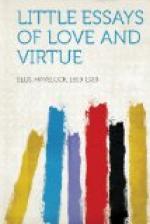It must not be supposed that there is any direct or speedy way of introducing into life a wider and deeper conception of the erotic play-function, and all that it means for the development of the individual, the enrichment of the marriage relationship, and the moral harmony of society. Such a supposition would merely be to vulgarise and to stultify the divine and elusive mystery. It is only slowly and indirectly that we can bring about the revolution which in this direction would renew life. We may prepare the way for it by undermining and destroying those degrading traditional conceptions which have persisted so long that they are instilled into us almost from birth, to work like a virus in the heart, and to become almost a disease of the soul. To make way for the true and beautiful revelation, we can at least seek to cast out those ancient growths, which may once have been true and beautiful, but now are false and poisonous. By casting out from us the conception of love as vile and unclean we shall purify the chambers of our hearts for the reception of love as something unspeakably holy.
In this matter we may learn a lesson from the psycho-analysts of to-day without any implication that psycho-analysis is necessarily a desirable or even possible way of attaining the revelation of love. The wiser psycho-analysts insist that the process of liberating the individual from outer and inner influences that repress or deform his energies and impulses is effected by removing the inhibitions on the free-play of his nature. It is a process of education in the true sense, not of the suppression of natural impulses nor even of the instillation of sound rules and maxims for their control, not of the pressing in but of the leading out of the individual’s special tendencies.[20] It removes inhibitions, even inhibitions that were placed upon the individual, or that he consciously or unconsciously placed upon himself, with the best moral intentions, and by so doing it allows a larger and freer and more natively spontaneous morality to come into play. It has this influence above all in the sphere of sex, where such inhibitions have been most powerfully laid on the native impulses, where the natural tendencies have been most surrounded by taboos and terrors, most tinged with artificial stains of impurity and degradation derived from alien and antiquated traditions. Thus the therapeutical experience of the psycho-analysts reinforces the lessons we learn from physiology and psychology and the intimate experiences of life.
[20] See, for instance, H.W. Frink, Morbid Fears and Compulsions, 1918, Ch. X.




